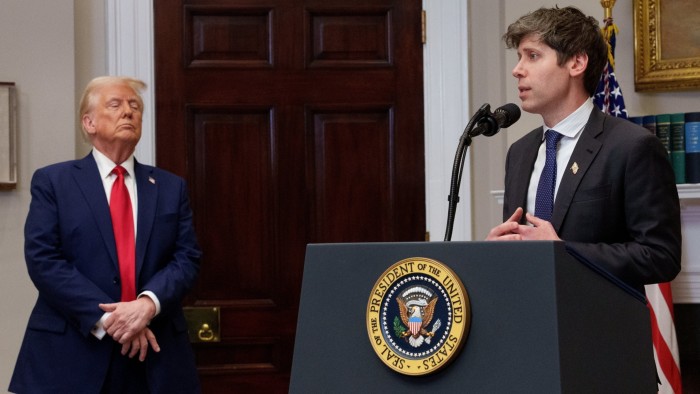Stay informed with free updates
Simply sign up to the Artificial intelligence myFT Digest — delivered directly to your inbox.
The writer is a fellow at Stanford University’s Institute for Human-Centered Artificial Intelligence and the Cyber Policy Center. She is the author of ‘The Tech Coup’
OpenAI has a new pitch for the world’s governments: buy “AI on democratic rails” through its “OpenAI for countries” initiative. The project is both smart politics and a lucrative business opportunity. The company will own every layer of the tech stack from data centres to the foundation model to the user interface. Elon Musk, appreciating the stakes, even tried to force his artificial intelligence company xAI into the deal.
Looking beyond the marketing, what does it mean for countries to build AI on democratic rails? On its blog, OpenAI says democratic AI “means the development, use and deployment of AI that protects and incorporates long-standing democratic principles” and even “human rights”. It goes on to outline how this package would prevent government use of AI to “amass control”. The framing taps into the competition between the US and China for dominance in the technology, a salient issue on both sides of the aisle in Congress.
Yet OpenAI signed its first deal under the new initiative in May with the United Arab Emirates — far from a cradle of democracy. Freedom House ranks the UAE as “Not Free”, with a bleak score of 18/100. The US State Department has itself documented significant violations of human rights, including the detention of political prisoners and widespread censorship. It is hard to imagine how OpenAI can build “democratic rails” for technology in a country hostile to free expression.
OpenAI has also pledged to support data sovereignty, giving governments legal jurisdiction over data created in their countries through the development of local data centres. Sovereignty is a sensitive point for governments, particularly given the US Cloud Act. In force since 2018, this hands federal law enforcement the power to compel American tech companies via warrant or subpoena to provide data stored on servers, including in third countries. It is unclear how OpenAI can promise sovereignty in light of this law, especially as the company explicitly says it will “work closely with the US government”.
Any country that signs one of OpenAI’s all-inclusive deals will probably get more than they bargained for: their AI infrastructure will contain a critical backdoor that grants the US access to their sensitive data and undercuts their digital sovereignty.
European allies have watched with alarm as US tech companies become instruments of American foreign policy. This hit home recently at the International Criminal Court. ICC chief prosecutor Karim Khan is reported to have lost access to his Microsoft email address after Donald Trump imposed sanctions in February. These threaten any person, institution or company with fines and prison time if they provide Khan with “financial, material, or technological support”.
In March, Ukrainian officials lost access to satellite imagery from Maxar, an American company, as the Trump administration campaigned to force the country to the negotiating table. Just imagine how much more leverage the US could have in negotiations if it has the power to turn countries’ AI capabilities off.
The timing of OpenAI’s global expansion is more opportunistic than principled. Growing market volatility and cheaper AI services have made investors wary of investing in Stargate, the ambitious OpenAI-led $500bn infrastructure project. Courting foreign governments offers a new revenue stream, while advancing American geopolitical interests. The initiative promises “hundreds of thousands of American jobs” while extending US AI infrastructure globally — a win-win for the country’s economic and strategic interests, potentially at the cost of partner nations.
The Trump administration’s actions over the past few months have shown how easily American loyalty can be bought. Governments should view companies that drape their products in a democratic banner with great scepticism. When Washington decides to weaponise technology access, partner countries will discover their “sovereign” infrastructure is anything but. Governments welcoming “OpenAI for countries” will lose expertise and capabilities at home, while becoming structurally dependent on US technology and, by extension, captive to presidential policy priorities.
Although OpenAI will profit handsomely from its project, the US government actually has the most to gain. No amount of democracy or sovereignty-washing will change the fundamental reality: this initiative serves American commercial and strategic interests first.
